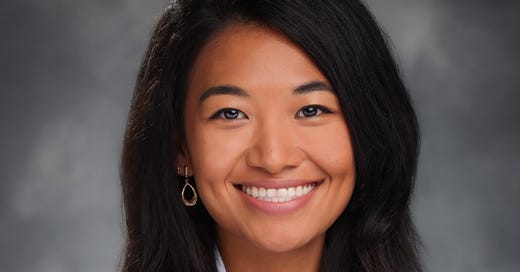New study shows negative bias on Tik Tok toward IUDs
Dr. Jenny Wu one of the co-authors of report
(Dr. Jenny Wu)
Dr. Jenny Wu noticed the number of Tik Tok videos that discussed Intrauterine Devices (IUD) as part of her work as a resident OB/GYN at Duke University School of Medicine. She felt that some of them were misleading and jaded. So she went about studying the matter and recently published a paper on the topic.
“I was seeing this disconnect between how we think about IUDs as providers versus how patients feel about IUDs,” Wu said. “And I just thought that it was really interesting, the type of videos that were out there.”
The paper, titled TikTok, #IUD, and User Experience With Intrauterine Devices Reported on Social Media, appeared in Obstetrics & Gynecology this month. Esmé Trahair, Megan Happ and Jonas Swartz were Wu’s coauthors. They used a web-scraping tool to gather and analyze content. They examined the top 100 videos that were tagged #IUD.
Their findings indicated that more videos conveyed a negative experience than a positive one. Of those that showed patient experiences, all the studied videos had a negative or ambiguous tone. And nearly 97 percent highlighted pain or side effects from the usage. Many of the videos revealed distrust of healthcare providers with things like their usage of anesthesia.
“I think what was really surprising for me was how overwhelmingly negative the most popular videos are, and perhaps some of that is just the way that the algorithm work,” Wu said.
Wu thinks a lot of women are moving away from IUDs. Many cite concerns about the insertion process. Some of that has to do with where they get their perspectives.
“People have perceptions about birth control coming from two ways,” Wu said. “One is from the experiences of their friends or family, and then one is from what they see on social media.”
Wu said it’s hard to find a solution. Engaging with influencers is one possibility.
“Who would reach out? Would it be me or a provider who would talk to these influencers? Or something that's part of the public partnership between the people that make IUDs and influencers?”




